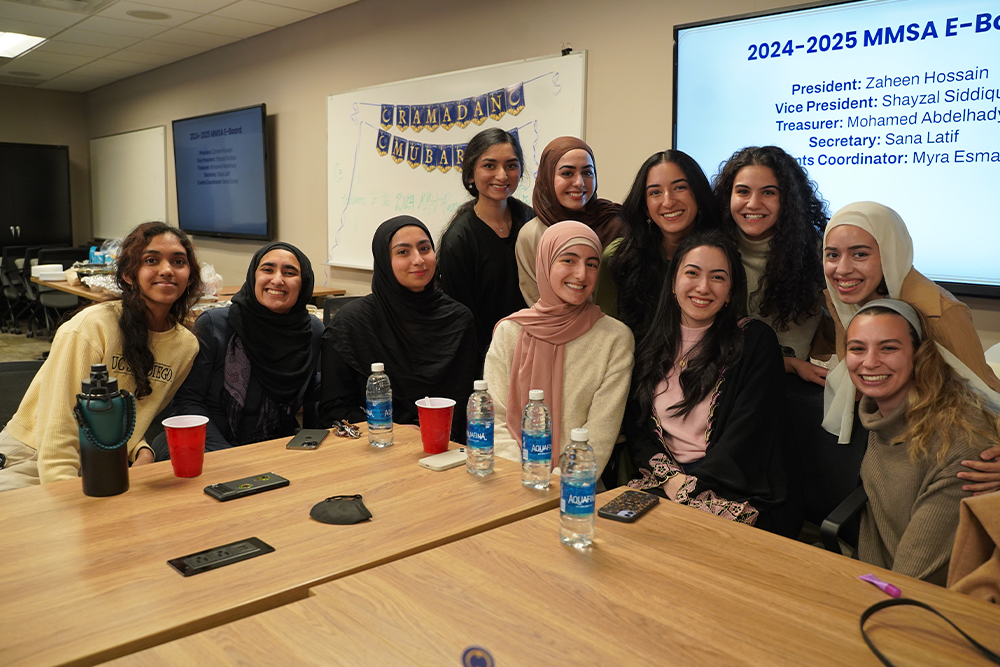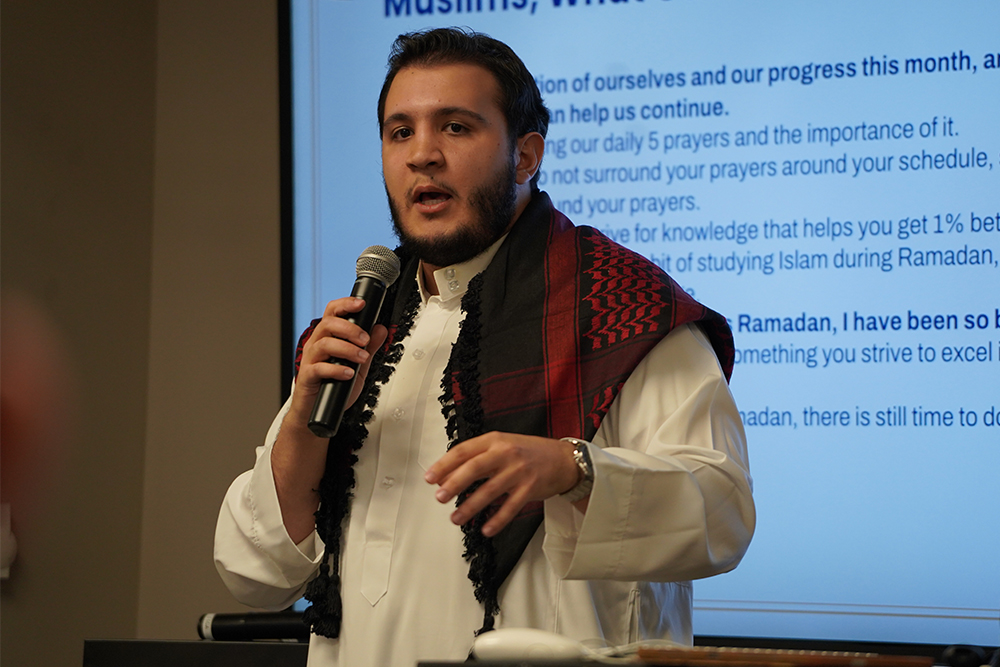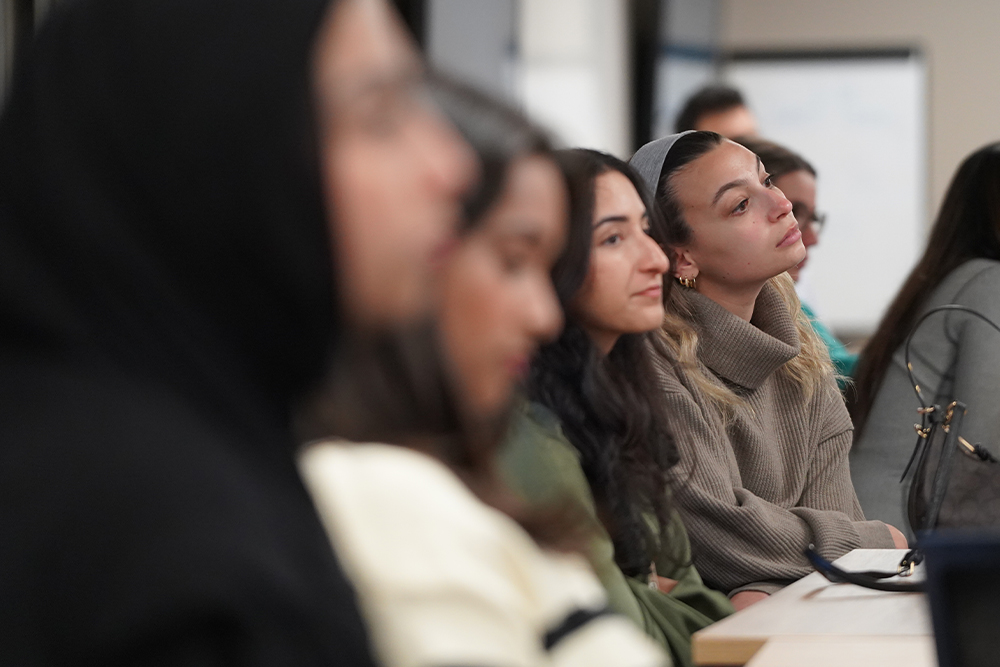
More than 50 medical students from Oakland University William Beaumont School of Medicine gathered Monday evening to learn about Ramadan and break the day’s fast as a community.
Hosted by the OUWB Muslim Medical Student Association (MMSA), both Muslim and non-Muslim students gathered in Oakland University’s O’Dowd Hall for the event that was entirely student-led.
Wesam Almasri, M2, president, MMSA, spoke immediately prior to sunset. He explained the meaning of the holy month of Ramadan, provided background on the related beliefs and traditions, and led the group in prayer.
“Ramadan is more than no food and no water (during fasting),” he said after his presentation. “It’s a sense of a spiritual boost. It’s a sense of motivation that we strive to be the best that we can be…(to) push ourselves to be the best that we can be to please our God.”
Ramadan is believed to be the month during which the Quran was revealed to the Prophet Muhammad. This year, Ramadan is March 11 to April 9.
Almasri explained that there are many other important aspects of Ramadan.
Wesam Almasri, M2, president, MMSA, spoke immediately prior to sunset. |
For example, observant Muslims pray five times a day during the month. Further, Muslims are encouraged to dedicate time to improve themselves spiritually by supplementing their fast with additional acts of worship; to reflect on one’s actions and treating others with kindness and respect; demonstrate perseverance and empathy to those who are less fortunate; and connect with community through charity and worship.
Almasri tied the practices to medicine.
“A core fundamental belief in Islam is to treat everyone with respect,” he said. “That’s something beautiful because it ties in with medical practice (because) we treat people regardless of where they come from, of their background, or what they are all about.”
Fasting from sunrise to sunset during Ramadan is one of the most observed pillars of Islam, intended, in large part, to allow those who practice to demonstrate self-restraint.
With few exceptions, fasting is considered obligatory for all observant Muslims. Almasri explained to attendees that there are several ways to break a fast: eating, drinking, and/or smoking; lying; intentional vomiting; and having sexual intercourse.
Depending on when Ramadan occurs, the fasting period can last up to 16 hours a day. According to Pew Research, eight in 10 Muslims say they fast during Ramadan. Many, including OUWB alumni, continue to study the practice.
OUWB medical students listen as Almasri talks about Ramadan, its history, and more. |
The daily meal in which Muslims end their fast after sunset is called iftar. It’s a tradition to break fast with dates, which is exactly what students did on Monday. Once the fast is broken, another prayer is said before worshippers eat a larger meal.
At Monday’s event, attendees ate Mediterranean food like shawarma, hummus, falafel, tabbouli, fattoush, and more.
Several attendees talked about why it was important to be part of the event.
Changiz Mohiyeddini, Ph.D., professor, Department of Foundational Medical Studies, was among them.
“Three weeks ago, I had a Shabbat dinner with some of my Jewish students, yesterday I had Easter with some of my Christian students, and today I was here to celebrate our Muslim students,” he said. “I appreciate them all and am happy to support them as well.”
M1 Zeeshan Javed said Ramadan is a “big portion of my spirituality.”
“The spiritual high that I get is something that I ride out throughout the year,” he said. “It really keeps me centered and focused…it’s one of the key things for my mental health.”
M2 Maya Jaradi said as a Muslim it was important for her to be at the event.
“I like to see the OUWB community get together and appreciate both our similarities and differences when it comes to cultures and religion,” she said. “It’s nice to get everyone together like this.”
M1 Suzanne Irani said part of the appeal of OUWB for her was how the community came together for events similar to Monday’s Iftar.
“When it came to finding the right medical school, I wanted a community that shares a passion for medicine, but also for practicing our faith together,” she said.
Jaradi echoed similar sentiments.
“When I was deciding where I would go to medical school, it came down to community,” she said. “This event is a good example. The M2s are studying for Step and we still had so many show up. We have M3s and M4s who have rotation duties and still came out because we all care and support one another.”
For more information, contact Andrew Dietderich, marketing writer, OUWB, at [email protected].
To request an interview, visit the OUWB Communications & Marketing webpage.
This work is licensed under a Creative Commons Attribution-NonCommercial 4.0 International License.



